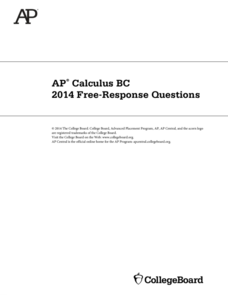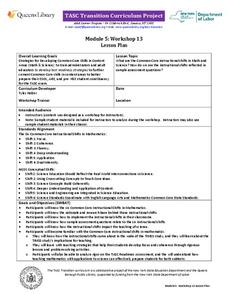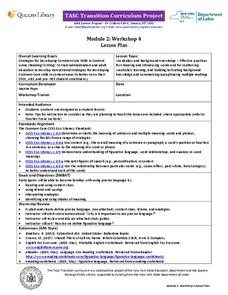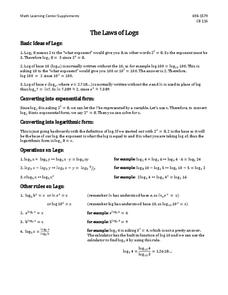College Board
2011 AP® Calculus AB Free-Response Questions
So this is the real test? The resource provides the free-response questions from the 2011 AP Calculus AB exam. The six questions are split into two sections, calculator and non-calculator items. Several resources give teachers...
College Board
2014 AP® Calculus BC Free-Response Questions
How much of the material is really important? Pupils use the free-response questions from the 2014 AP Calculus BC exam to see how the questions appear. With the supporting material, teachers understand the topics that appear on the test...
College Board
2017 AP® Calculus BC Free-Response Questions
Pupils use the six released free-response questions from an AP Calculus BC exam to prepare for their own exam. The questions cover a range of topics from the BC curriculum, with half of the items coming strictly from AB material and the...
College Board
2018 AP® Calculus AB Free-Response Questions
Pupils interact with six released questions from the 2018 AP Calculus AB exam. Teachers use the additional materials to determine where the class is in terms of readiness for the exam to help provide additional instruction as needed.
College Board
2010 AP® Calculus AB Free-Response Questions
Is this going to be on the test? The resource contains the AP Calculus AB free-response questions that were on the 2010 test. Pupils use the six questions to prepare for their tests. Teachers use the included response resources to...
University of Kansas
Newspaper in the Classroom
Newspapers aren't only for reading—they're for learning skills, too! A journalism unit provides three lessons each for primary, intermediate, and secondary grades. Lessons include objectives, materials, vocabulary, and procedure, and...
Mascil Project
Sports Physiology and Statistics
If I want to build up my heart, where should I start? Science scholars use statistics in a sports physiology setting during an insightful experiment. Groups measure resting and active heart rates and develop a scatter plot that shows the...
Orange Public Schools
Stagecraft
The house lights dim, the curtain parts, lights slowly come up, revealing the stage. Before the actors appear, before a word is spoken, the audience is drawn in by the lighting, by the colors, by lines of the set, by the props, and...
New York State Education Department
TASC Transition Curriculum: Workshop 13
The six instructional shifts in this workshop definitely move math and science teachers' understanding of instruction. The workshop, 13th out of a series of 15, asks participants to examine sample tests and to look at how the six...
New York State Education Department
TASC Transition Curriculum: Workshop 11
You'll C-E-R a difference in classroom achievement after using a helpful lesson plan. Designed for economics, civics, government, and US history classes, participants practice using the CER model to craft arguments about primary and...
New York State Education Department
TASC Transition Curriculum: Workshop 4
Why is it important to use precise language? Participants explore this question in the fourth activity in a series of 15 on effective instruction. Perfect for all content areas, the activity promotes appropriate language choice through...
Howard Hughes Medical Institute
Population Dynamics
Will human population growth always be exponential, or will we find a limiting factor we can't avoid? Young scientists learn about both exponential and logistic growth models in various animal populations. They use case studies to...
GeoGebra
GeoGebra Graphing Calculator
So, exactly, what does it look like? The easily usable graphing calculator allows pupils to visualize the graph of equations and inequalities. The interactive supports any algebraic graph needed for high school mathematics and then some.
EngageNY
From Ratio Tables to Double Number Line Diagrams
How much sugar is in one bottle? Pupils use double number line diagrams to determine the amount of sugar in a 1L bottle of cola. The teacher leads a discussion on ways that double number lines can be of assistance in solving a problem...
EngageNY
Markup and Markdown Problems
There is a 100 percent chance this resource will help pupils connect percents to financial literacy. Young mathematicians use their knowledge of percents to find markups and markdowns in financial situations in the seventh segment in a...
Conneticut Department of Education
Instructional Strategies That Facilitate Learning Across Content Areas
Imagine 28 instructional strategies, appropriate for all subject areas and all grade levels. Directed Reading-Thinking Activities (DRTA), Question-Answer Relationship (QAR) activities, KWL charts, comparison matrixes, classification...
Curriculum Corner
Order of Operations Task Cards (2)
Young mathematicians use their PEMDAS knowledge to solve 20 different task cards. They evaluate expressions to find the answer of multiplication, division, addition, subtraction, and exponential problems. Then, they record their answers...
EngageNY
Solutions of a Linear Equation
Use the distributive property to solve equations. The sixth lesson in a 33-part series has scholars solve equations that need to be transformed into simpler equations first. Class members apply the distributive property to the equations...
West Contra Costa Unified School District
Search and Rescue Activity
Get your classes moving and practicing sequences at the same time! Learners move about the room solving problems and finding their solutions. Problems include both recursive and explicit formulas and both geometric and arithmetic sequences.
Mathematics Assessment Project
Representing 3-D Objects in 2-D
How does the shape of the surface of water in a container change as water leaks out? After tackling this question, learners take part in a similar activity with more complex figures.
Math by Design
Transformations – Reflections
Scholars use interactive resources to figure out how to mathematically draw a reflection of a geometric shape viewed in a mirror. To conclude the activity, class members are asked to deduce the result of multiple reflections across...
Del Mar College
The Laws of Logs
Two students were sitting on a log and decided they wanted to be awesome at math. Bring in the logarithm handout! The first page introduces the idea of a logarithm and the different operations and rules it entails. The second page...
Del Mar College
Solving Systems of Equations
Lets keep the system working and show learners the three ways to solve linear systems of equations. Each method includes step-by-step instructions to work their way through the problem. The same problem is used for each method to show...
Del Mar College
Exponential and Radical Rules
So many rules and so little time. Make it easy and provide all the exponent and radical rules in one place as an easy reference guide. All of the properties come with several examples to show how the rules apply to different problems.

























